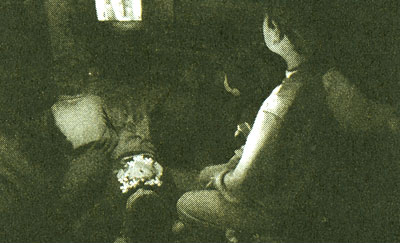
For centuries, the kingdom of Bhutan has shrouded itself in a self-imposed isolation that began to lift only in the 1960s, and even then only slowly. Tightly wedged between the world’s two most populous nations, India and China, this tiny country has jealously guarded its sovereignty. with strictly controlled tourism and a conservative foreign policy. Unlike much of the non-industrialized world, Bhutan pursues a cautious development policy, one that limits the economic assistance of foreign governments. This nation of just over half a million Vajrayana Buddhists pursues a stated goal impossible to imagine anywhere else: Gross National Happiness. In local interpretation, this is a blend of material progress, spiritual well-being, and a healthy life in the kingdom’s pristine natural environment.
But if Bhutan found protection for centuries behind the inaccessible Himalayan peaks, it is now grappling with a new challenge: television, introduced two years ago during the twenty-fifth coronation anniversary of King Jigme Singye Wangchuck, Bhutan’s fourth hereditary monarch. Recognizing the unavoidable influence of globalization, as well as the growing demand for television (particularly for World Cup coverage) among it own citizens, the government of Bhutan permitted the introduction of cable access two years ago.
“The introduction of television and Internet in Bhutan today is a reflection of the progress that we have achieved,” King Wangchuck told his people when he announced the introduction of television on June 2, 1999. “I trust that you will use your good sense of judgment in using television and the Internet.” While most Bhutanese heard his words, many do not understand them yet, and few appear to heed them. In a country that has one telephone for every 429 people, and in which electriciry reaches 34 percent of the houses, almost a quarter of the population already watches television.
Forty cable television channels have not only shattered a serenity long disciplined by the strong influence of a Buddhist lifestyle, they have also suddenly brought the world into the Bhutanese home—that is, the world as presented by television’s patchwork of images. Major towns across the country, with populations ranging from 5,000 to 40,000, are now tuned in to a variety of channels largely dominated by MTV, Indian dramas and soap operas, and Hollywood films. What is perhaps more significant, the Bhutanese population is dealing with a seductive new culture: advertising, the influence of which is visible even high up on the stupa-lined mountains where, traditionally, travelers would stop to chant prayers and fly prayer flags. Today, passengers shout “AIWA” to each other as their buses tumble along the mountain roads, imitating a popular advertisement for a Japanese electronics company. After two years, observers note television’s impact with more than a little concern.
“Television can dilute the very essence of the Bhutanese identity, our culture,” says Sangay Wangchuk, secretary of the National Commission for Cultural Affairs, which was established to promote Bhutanese religious and cultural heritage. “Without our identity, we can easily disappear as a race, even as a nation.”
Bhutanese leaders worry that television might tip the fine balance that the kingdom’s modernization policy seeks ro protect. Bhutan’s population is 80 percent rural, and the younger generation is showing signs of restlessness as life in the urban centers appears more attractive. “Television might reinforce the process of rural-urban migration which is already an emerging problem,” says Daw Tenzing, secretary of the Planning Commission. “This will widen the gap between the rich and poor.”
In a land where the spectacular and rugged mountain terrain makes distances short but journeys long, the underlying fear is that the seductive visual images of television will compete with the pursuit of Gross National Happiness.
“Bhutanese society is concerned because it has always been an oral society,” says freelance journalist Siok Sian Dorji. “This oral tradition can easily be overpowered by the visual media before Bhutan is able to develop a strong contemporary literary base.”
But television is now a part of Bhutanese life. Accepting this, Bhutanese decision-makers are developing a policy to use electronic media as an education tool to help society make informed decisions. “This is the age of information and globalization,” says a government official responsible for drawing up a national information and technology policy. “We cannot be left behind. We need television, Internet, and other media to strengthen our society and ro make Gross National Happiness more relevant to modern times.”
Bhutan’s relationship with television is a challenging one, particularly as the new generation grows up in a world vastly different from that of their parents. In the past WWF was understood in Bhutan as the World Wildlife Fund. Since 1999 it has come to stand for the World Wrestling Federation. And this is only the beginning. The impact of television on this country is just now being felt, and the long-term consequences are not yet known.
Thank you for subscribing to Tricycle! As a nonprofit, we depend on readers like you to keep Buddhist teachings and practices widely available.